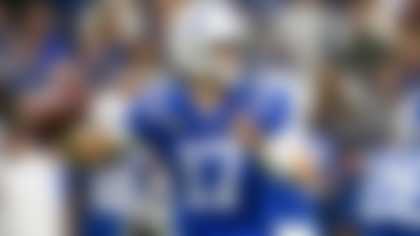On July 25, DeMaurice Smith walked right past where he, his players, the owners and commissioner Roger Goodell stood and officially ended the lockout a year prior. And as he walked into the NFLPA offices in Washington, D.C. for another day of work, he did take a second to stop and reflect on all that happened through the tumultuous four-month lockout, and what's happened since.
The memories of the moment remain good, even if the peace among the parties was only temporary.
"I've had this overwhelming sense this week of what we did, so few people had a lot of confidence in the players' ability to embrace the issues and remain together in the face of what we were facing, even before the lockout, and then in the lead-up to the lockout," Smith said, over the phone on July 25. "I've been thinking about the courage of our leaders. Obviously, guys like Kevin Mawae, Mike Vrabel and Tony Richardson have moved on, but those were the guys who, from the time Gene (Upshaw) died to those pivotal moments, engaged in an effort to protect and serve their fellow players.
"For the players, the challenge to get there started shortly after Gene died. It was how they got together, pulled together, found new leadership -- all of those Herculean efforts before we even got to the point where we were locked out -- that I think about. It's everything."
This weekend, the actual collective bargaining agreement -- the one signed on the steps of the Hall of Fame last August -- turned 1 year old. As Smith said, it took a lot of work together there, and there were dark days along the way. In the end, a 10-year agreement was reached.
The question now is how the time will be remembered as the deal ages.
Goodell declined an interview request when asked to discuss his own memories, but provided a statement on what he takes away, a year later.
"It took a lot of resolve and hard work, but we reached an agreement with many positive changes for both sides," he said. "We preserved the season and put ourselves in position with the players to allow the league and players to continue to grow and improve for the fans and to make it a better, safer game."
No matter what you hear, it's too early to declare winners and losers in a CBA that still has nine years left on it. The players took home a larger share of television money, which was their goal, and so until the new TV deals kick in (starting in 2014) and begin to factor in to the economics (starting in 2015), it's hard to truly assess the deal. Based on the structure, the owners were always going to win early, though you could argue to what degree it would happen.
As such, it's not easy for either Goodell or Smith to fully pick through the fallout. And that's why it was interesting to hear Smith respond to the question of whether or not he had any regrets.
"Really, no," he said. "Coming into this process in 2009, we had a number of goals in mind. My overarching goal was to make this negotiation the most player-involved negotiation of all time. And there's not a person on the planet who wouldn't agree that the players were more involved. We had more leaders involved than at any time in history, whether it was individual meetings, or the way we approached the whole process."
Smith says he wanted a "player-led union," and he did get that. Outside of the aforementioned now-retired players, new leaders like Domonique Foxworth emerged. (Foxworth took over for Mawae as NFLPA president in March.) And beyond just getting involved, a point of pride for Smith is how educated so many of the players became.
The debate on an 18-game season provided one example. Money was the carrot dangled in front of the players. Perspective, though, was needed. The extra $800 million in revenue seemed great on the surface, but cut that number in half, to split with owners, and then divide by 1,800 players, and the gains were far less significant. Those adjusted numbers weighed against added risk and shortened careers? Not so great.
Through the process, many thought the lure of the dollar would ultimately make the players break on 18 games. At one point, it was seen as a fait accompli. So Smith was proud of their ability to see nuance, and make an issue like that non-negotiable.
"You have players who took it upon themselves, and made it an obligation to be vested in the process," Smith said. "The players refused to be simple and one-dimensional."
There were clear wins for the owners, of course. They kept player spending down through the life of the existing television deal, and will get a larger payoff on the money spent in entrepreneurial ways. Some of the skewed uncapped-year byproducts -- like rising franchise tag numbers -- were corralled. So yes, they met plenty of their objectives in conducting the lockout.
But Smith is sure to emphasize that the CBA is a "living deal" that needs to grow and mature. And it contains immediate wins for players in guaranteed spending and player health and safety.
One thing we do know, after the last year, is that "labor peace" is a relative term. Smith and Goodell have done battle over the New Orleans Saints' bounty scandal and the Washington Redskins/Dallas Cowboys salary cap situation, among other things. It's provided images different than those of the two championing the new deal last summer, of course, and raised new questions, ones that neither leader seems overly worried about.
Coaches Film, only on NFL.com
Purchase NFL Game Rewind and receive access to Coaches Film, which includes camera angles previously only available to coaches, scouts and officials.
"I don't spend a lot of time worrying about the perception of our relationship," Smith said. "Roger and I have a great relationship. We can talk and work through issues. Does it mean we agree on everything? No. But we have a good, respectful relationship. I'd guess that neither of us is worried about that perception. Do we each have the ability and wherewithal to represent our constituency? Yes. Does the league have strong people leading it? Yes. Do the players have strong people representing them? Yes.
"You have two strong, capable parties, and that means that every now and then, there are going to be issues that are formidable."
And given that Goodell is expected to hold his position for the foreseeable future, it's natural to ask Smith about his own plans, particularly after some believed he'd be a short-termer with an eye toward politics. His response: "I have the best job on the planet. And I'll leave it at that."
What's unlikely is the idea that Smith and Goodell will ever be in the spotlight again the way they were a year ago, with so much on the line. When asked if he'll remember that time fondly, Smith simply says, "I'm gonna duck that one," pushing his answer instead, again, to his pride in the players involved.
These guys know that when folks look back on 2011 when it's 2031 or 2041, the history books will highlight the lockout in reasoning why the year was an important one in the annals of pro football. Who won the Super Bowl? The MVP award? Those will be footnotes.
Smith hopes that years down the line, it will be seen as a turning point for how players participate in their union and how their own long-term well-being is handled within labor agreements. But no matter what happens, now, one year later, the union's leader thinks there's plenty for everyone to be proud of.
"I've been blessed to do a lot of different types of things in my career, and I've found the things that are most satisfying happen when pools of people get together to do things that none could've accomplished individually," he said. "It's the player leadership, but it's also the league, Roger, the owners, everyone. Getting that deal done, and doing it in a way where we didn't miss any games, ensuring there were the right financial incentives for both parties and the right safety measures. ... What stuck out to me in negotiating all of that was the triumph of teamwork.
"It's one of those things where people are going to focus on the individual, but it's the group that got it done."
Follow Albert Breer on Twitter @AlbertBreer












